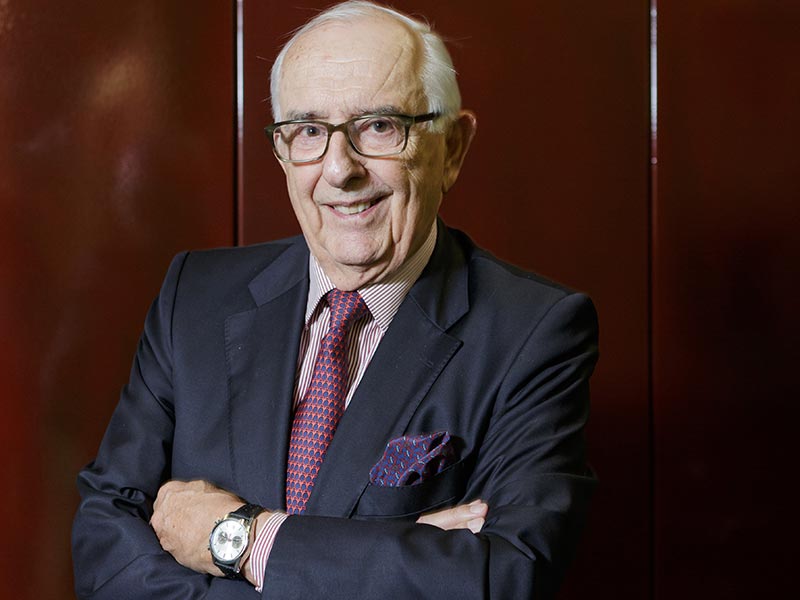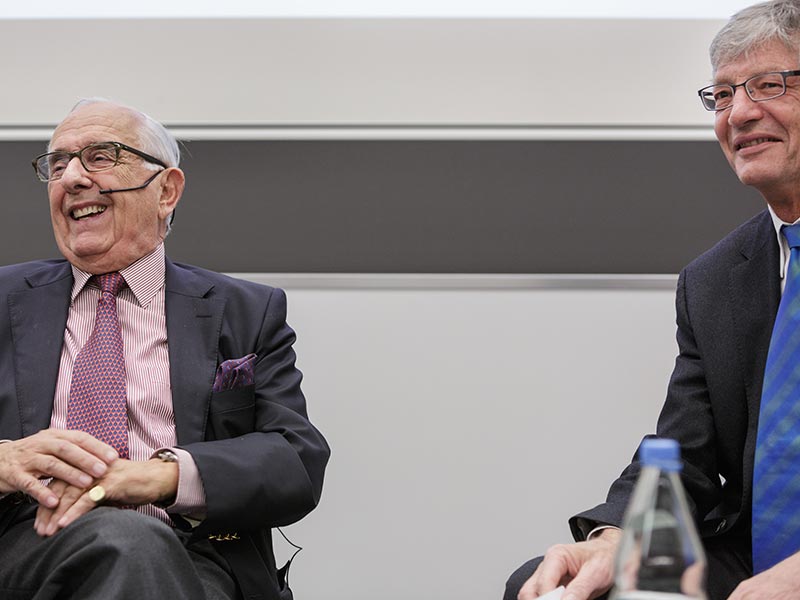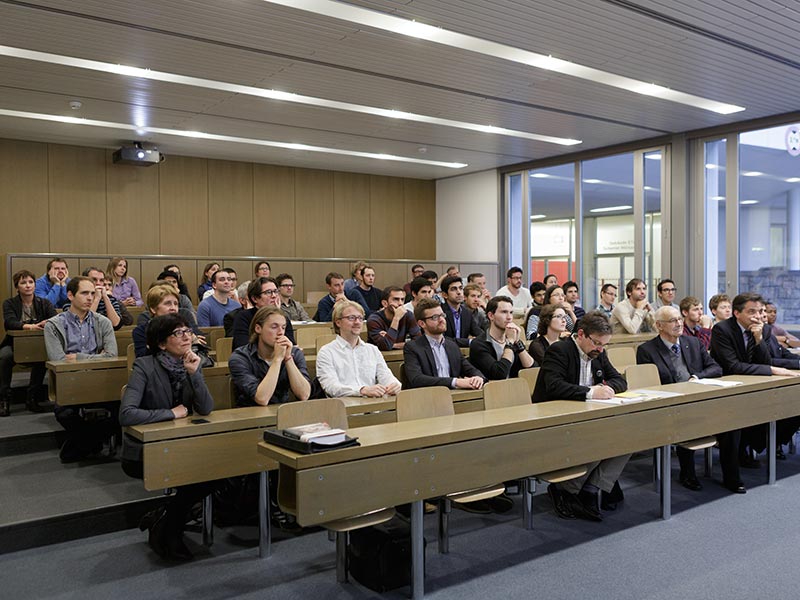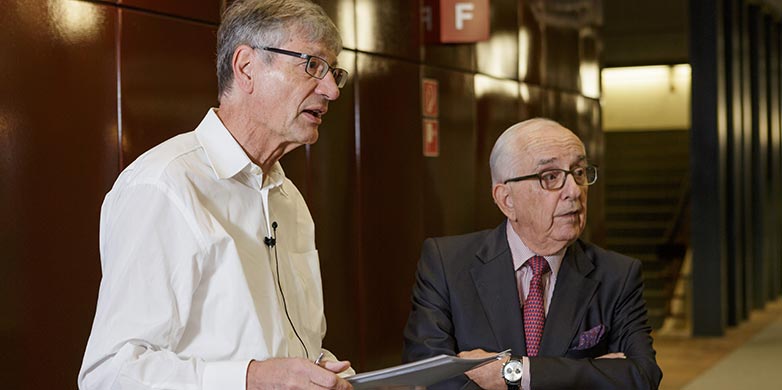The man who never cracked – Jack Heuer visits ETH Zurich
ETH alumnus Jack Heuer is one of the greats in the history of the Swiss watch industry. On Tuesday he visited ETH Zurich and shared his experience with ETH students.
Jack Heuer is an elegant raconteur. As the 82-year-old talks about his life as an entrepreneur, his words reflect all the highs and lows of the Swiss watchmaking industry since 1950. The wealth of experience that he has accumulated over his lifetime is very valuable for students aspiring to a career in industry or wishing to set up their own company.
On Tuesday, about fifty students on ETH's own sponsorship schemes, "Excellence Scholarships" and "Pioneer Fellowships", accepted the invitation from the Department of Information Technology and Electrical Engineering (D-ITET) and the ETH Zurich Foundation to attend the "fireside talk" between Jack Heuer and moderator Rolf Probala in the ETZ Building.
For Jack Heuer, one of the all-time greats among Swiss watchmakers, it was also a return to his past: he studied at ETH Zurich from 1952 to 1957 and graduated with a degree in Electronics Engineering, specialising in Management Science and Manufacturing Technology. He had chosen ETH after a trilingual upbringing in Biel (German, French and English), because his careers adviser at the time recommended a new course combining mathematics, economics and electrical engineering.
Watches before and after semiconductors
As Jack Heuer writes in his external pageautobiographycall_made, he was especially interested in production even as a student. He wrote his dissertation on the subject of how to reduce production losses. "At ETH Zurich I also learned the importance of easy-to-read dials," said Jack Heuer on Tuesday. By the age of 30, he had taken over as head of the family business Ed. Heuer & Co. SA, founded by his great-grandfather Edouard Heuer (1840-1892). "I didn't want to stay in research, I wanted to become a businessman like everyone did in my family," explained Jack Heuer to today's ETH students.
For the following two decades, from 1961 to 1982, he controlled the fortunes of Heuer watches. He saw for himself the decisive impact on the watch industry of the introduction of semiconductor technology, starting in 1971. Until then, Heuer had built its reputation on chronographs, that is to say, analogue wristwatches which included a stopwatch and were based on mechanical workings. In the 1960s, Heuer's Carrera watches were icons among Swiss watches.

Even in the new semiconductor era, during the 1970s Heuer initially enjoyed some success with LED and LCD stopwatches. However, as he confessed to the students, he underestimated the importance of the development of quartz and digital watches. This had serious consequences: in 1982 Heuer got into financial difficulties and, following a hostile takeover, Jack Heuer was dismissed from his own company.
Starting a second career at 50
At the age of 50, he had to start again. "It wasn't easy. I was the father of three children." However, Jack Heuer did not crack under the pressure (see also the film about his life, "Jack Heuer History"), but embarked on a second career in electronics. He became the European representative of IDT Integrated Display Technology, based in Hong Kong. In this role, he quickly returned to success with innovative digital thermometers and barometers.
For Jack Heuer, one of the keys to his success as an entrepreneur was combining technology, design and marketing: "Innovation is about more than technical progress," said Heuer. "With watches, the design plays an important role." At the start of his career in America, he had also learnt the then novel arts of marketing communication and media relations: "In the 50s, that was all still unknown in Switzerland."
Last but not least, Jack Heuer achieved success thanks to his clever sponsorship of, among others, Hollywood actors and Formula 1 racing, where from 1971 Heuer sponsored the Ferrari racing team, turning his family business into a global brand. When, in 2001, the TAG Heuer watch company appointed him Honorary Chairman, he was able to draw a line under the most difficult period of his career.
When asked about it by a student, Jack Heuer said that the experience was still painful to look back on today. In response to more questions from students, Jack Heuer said that the days of mechanical watches were far from over, because for men, wristwatches are also a status symbol. He also said that he fully supports start-ups, such as the ETH spin-off external pageu-bloxcall_made, a supplier of semiconductor components for electronics systems.
Looking back at his career, would he do anything different today? "After my degree, I would join a consultancy company and then set up a company later – when I had the money for it," concluded Jack Heuer, before going on a tour of a D-ITET laboratory and then attending the cocktail reception.
Pictures of Jack Heuer's visit at ETH Zurich
-

Jack Heuer, the man who never cracked. (Photo: ETH Zurich/Tom Kawara) -

Jack Heuer talking to interviewer Rolf Probala. (Photo: ETH Zurich/Tom Kawara) -

ETH students and ITET professors listen attentively to Jack Heuer. (Photo: ETH Zurich/Tom Kawara)

